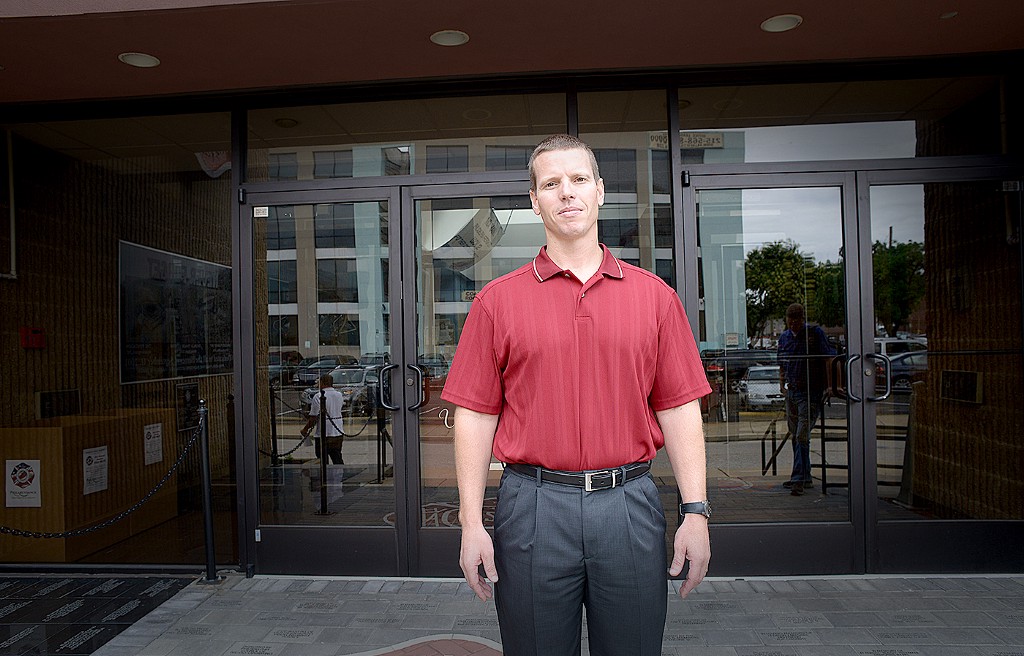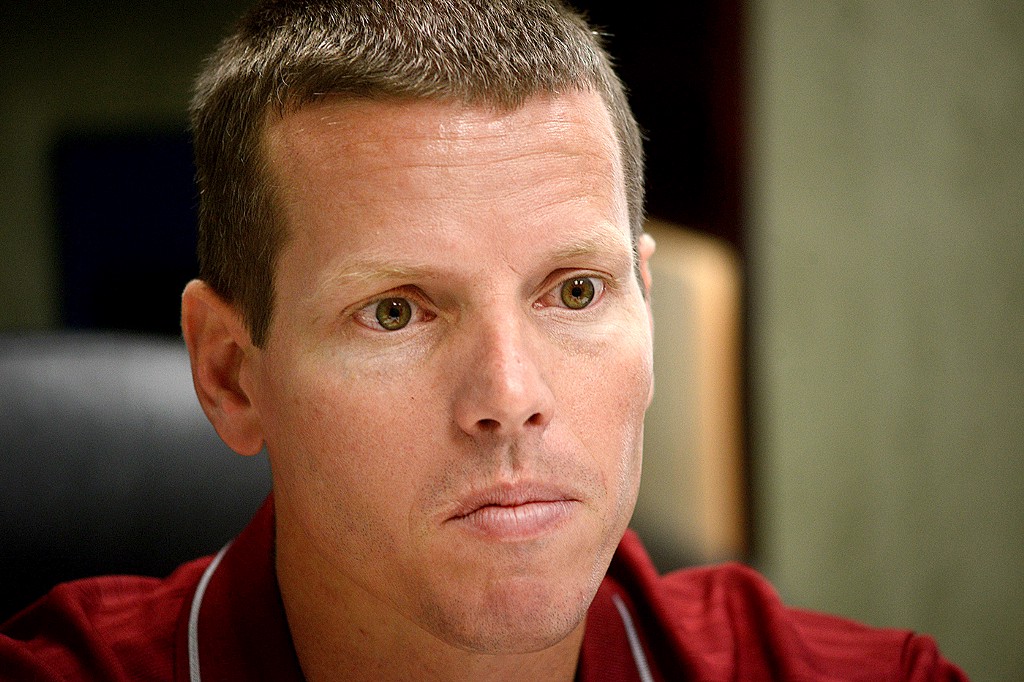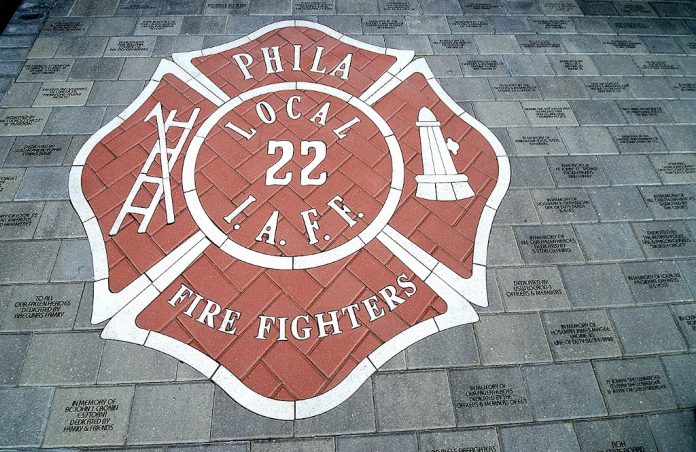A solid foundation: Local 22 is counting on community and political support for its agenda. MARIA POUCHNIKOVA / TIMES PHOTOS
As the new leader of the city’s firefighters and paramedics union, Local 22 President Joe Schulle knows he’s going to have many battles to fight on behalf of the union’s 1,900 active members and 2,100 retirees.
Forging a new labor contract, while collecting on a recently expired one, are among the looming challenges, according to Schulle, whose union also has beefs regarding work shifts, transfers, hiring, promotions, training and discipline, among others.
Yet, all of those complaints may not add up to perhaps the greatest challenge facing the union leader, according to fire department insiders past and present. Schulle must also tackle the enemy within: a prevailing acrimony and frustration among Local 22 members directed mainly at Mayor Michael Nutter and the fire department leaders who serve at his prerogative.
“In my time and since I left [the department], I’ve never seen morale as low as it is now. And morale is such an important part of what they do,” said Roger Ulshafer, whose four years as fire commissioner from 1988 to ’92 concluded his 34-year career in the department. “Relations between labor and management couldn’t be worse.”
“I can tell you, there’s a great number of disgruntled individuals, primarily about the contract,” agreed William Richmond, who was fire commissioner from 1984 to ’88 and served 28 years in the department.
A survey of fire department employees released 19 months ago by Berkshire Advisors, a consultant commissioned by the Pennsylvania Intergovernmental Cooperation Authority to study management and operations of the department, spotlighted the bad feelings.
Berkshire asked about 2,200 uniformed and nonuniformed employees to assess dozens of hypothetical statements about the department. Participants were given a choice of five responses for each statement, ranging from “strongly agree” to “strongly disagree.”
More than 1,800 employees responded, of whom 81 percent were firefighters and 10 percent were paramedics. The results pointed to an overwhelming dissatisfaction with the department’s senior leaders (specifically Commissioner Lloyd Ayers and his deputies), as well as the department’s hiring, promotion, discipline and transfer processes.
Former Mayor John F. Street first appointed Ayers in December 2004. Nutter has retained Ayers since taking office in January 2008.
While 85.2 percent of survey-takers agreed or strongly agreed that they personally are “open to new ways of doing business,” 76.1 percent disagreed or strongly disagreed that the commissioner and his deputies also are open to that method. Almost 82 percent indicated that employees “work effectively together” within their units, but almost 54 percent indicated that the commissioner and deputy commissioners do not.
More than 89 percent indicated that they are “held accountable for [their] performance,” while more than 52 percent disagreed or strongly disagreed that the commissioner and his deputies are “held accountable for the decisions they make.”
Ayers did not respond to requests for comment for this article. The commissioner was among seven administration, fire department and union officials who comprised the Berkshire study’s steering committee.
When asked to assess labor-management in the department during a July 25 interview with the Northeast Times, Schulle tried to be diplomatic.
ldquo;I would categorize it as a strained relationship. The contract is the majority of the problem right now. [But] we have many challenges. I don’t think having a contract would make a lot of these problems go away.”
Local 22, a branch of the International Association of Fire Fighters, conducted its own survey this year with many questions focused on the union’s more than 200 paramedics. Schulle got the results in late July. About half of paramedics took part. While withholding the full survey results, Schulle told the Times some key findings.
The work schedule is a sore spot. Traditionally, medics and firefighters would rotate between day shifts and night shifts. But the department recently turned all paramedic assignments into steady day or steady night shifts.
Seventy-eight percent of night-shift paramedics said that the work schedule has heightened their feelings of depression, while 92 percent said the schedule compromises their ability to do their jobs. Also, more than 60 percent said that the night shift has hurt their relationships with their wives and children, while more than 90 percent said they don’t think their days off give them enough recovery time.
“Your family life is harmed,” Schulle said of those assigned to night work. “You don’t see your wife. You don’t see your kids. You don’t eat at home four or five days a week. The days you’re off from work, you can’t sleep at night.”
Firefighters generally are concerned that the department will force them into a similar schedule.
“In recent history, everything they do with the medics always comes down to the firefighters,” Schulle said.
That includes another personnel management policy, mandatory transfers every few years. Commonly known as “rotations,” the policy generally calls for paramedics to change companies every three years and firefighters every five years. The policy is unpopular because it forces firefighters and medics to leave work environments where they feel most comfortable and feel that they perform at their best.
“In the past, you could be assigned to [the same] firehouse for most of your career,” Schulle said. “It’s like [being in] a small group in the military. You know what the other person is going to do and you know what their capabilities are. … Rotations are not done anywhere else in the country.”
Among 111 paramedics who took part in the union’s recent survey, 108 indicated they don’t want the rotation policy, according to the union leader.
How this rank-and-file dissatisfaction manifests itself in the fire department’s level of service to the city remains a matter of opinion.
In calendar year 2012, the department recorded 25 citizen fire fatalities in the city, the lowest total in history and a reduction of seven from the previous year. The number of citizens injured in fires remained about the same: 171 in 2012 after 173 in 2011. The fire department responded to 276,939 emergencies in 2012, a decrease of 0.3 percent over the previous year, including 231,520 medical emergencies.
However, the department’s emergency medical response times were well below national standards and have gotten worse in recent years, according to City Council President Darrell Clarke.
During Council’s annual budget hearings on April 24, Clarke stated that national standards call for EMS providers to respond to calls within nine minutes 90 percent of the time. But during the fiscal year ending June 30, 2012, the fire department met the nine-minute standard 68 percent of the time, a 6-percent decrease from fiscal 2008. The department’s response times to fire-related calls were not included in that analysis.
In response to Clarke’s questioning in Council’s chambers, Ayers said that he is trying to address the problem through additional hiring and developing a priority dispatch system that will distinguish non-emergency medical calls from true emergencies and reduce the demand on paramedics.
Further, response times for the department’s roughly 45,000 annual fire emergencies have also risen. According to an Aug. 2, 2011, Philadelphia Daily News report, average fire engine-response times reached a 10-year high of 4 minutes, 53 seconds in 2010, and had increased to 5 minutes in the first half of 2011.
Schulle’s predecessor as Local 22 president, Bill Gault, blamed the worsening response times on the controversial Brown Out Program, in which the department shuts down selected engine companies on rotating days for an annual savings of $3.8 million to the city’s $3.8 billion operating budget. Schulle thinks that brown outs aren’t worth the reduction in service.
“Brown outs should be stopped. [The program] is a minimal cost-saving policy,” said Schulle, who declined to speculate on the administration’s justification for it. “You’ll have to ask them that.”
The Nutter administration did not respond to requests for comment on any of the issues mentioned in this article.
Schulle said that he is willing to criticize individual policies openly, but he won’t comment on the administration’s possible motivations because he hopes to forge a less-contentious relationship with the mayor’s office.
Gault had no such qualms. In four years as Local 22 boss, he rarely hesitated to accuse Nutter of injecting politics and personal vendettas into his handling of fire department issues, ranging from contract negotiations to the union representation of paramedics.
“I think it’s personal with the mayor against Local 22: the firefighters and the paramedics. It’s been going on since Michael Nutter took office,” said Gault, who lost out to Schulle in a union election earlier this year and says he now supports Schulle, who took office on July 1.
During Gault’s tenure, union members repeatedly gathered outside City Hall with others in the organized labor movement to protest the administration. In some instances, members carried signs depicting Nutter as a clown or in a jail cell — referencing the administration’s policy not to implement raises and better union benefits, despite arbitration outcomes and court rulings favorable to the union.
Local 22 members also helped shout down the mayor’s 2014 budget address at City Council in March, along with members of the city’s non-uniform municipal unions, AFSCME District Councils 33 and 47.
At the funeral of Fire Capt. Michael Goodwin in April, firefighters applauded enthusiastically during the service at St. Michael’s Lutheran Church after the Rev. Marjorie Neal called upon Nutter, who was sitting in a front pew, to give the firefighters raises and better benefits, something, she said, that Goodwin had long wanted.
Relations between Gault’s Local 22 and Nutter hit perhaps their lowest point in 2011 when the union chose not to endorse the mayor’s re-election campaign. The union instead backed longshot former state Sen. and ex-convict Milton Street in the Democratic primary.
“Billy made a huge mistake,” Ulshafer said of Gault, whom he considers a good friend. “He totally alienated the administration by backing Milton Street instead of Nutter.”
At the time, the union cited the contract dispute, as well as Nutter’s closing of seven fire companies in January 2009, for shunning the incumbent. Local 22 recording secretary Mike Bresnan reportedly told The Philadelphia Inquirer that Milton Street had promised the union to restore the seven companies and end the Brown Out Program, if elected.
Nutter won the nomination in a landslide. And Schulle won the Local 22 presidency with an overwhelming majority of the votes from active-duty members. Gault held an edge on retirees’ ballots. It wasn’t a total victory for Schulle, however. His “ticket” had challenged for seven seats on the 10-member union board, but won three. Incumbents retained the other seven.
Moving forward, the union will focus less on public protests and more on political and legal tactics to achieve its goals.
“[Demonstrations] are really not my style,” Schulle said. “In the past, they have been successful in certain situations. [But] I think they’ve been done enough.”
The union made perhaps its biggest tactical move under his leadership last month when it announced an effort to change the city charter to limit the ability of the mayor to unilaterally appeal firefighter arbitration awards. Leading political figures in the city have lined up behind Local 22, including U.S. Rep. Bob Brady, City Controller Alan Butkovitz, state Sen. Mike Stack, numerous state lawmakers and City Council members from both major political parties. The city’s leading municipal and building trades unions also back the plan, which would require an affirmative vote of City Council and a public referendum.
“Our partnerships are directly related to those concepts … politics and the labor movement,” Schulle said.
In the meantime, the union is trying to take up the noncontract issues with the Nutter administration individually, but only the courts are likely to settle the contract dispute, according to the union president. The sides have been fighting for more than four years through multiple rounds of arbitration and appeals, primarily over wages and health-care benefits. Local 22 members, who are prevented by state law from going on strike, last got a raise on Jan. 1, 2009, and have been working essentially without a contract since July 1 of that year.
The city and union two weeks ago began arbitration on a new contract. The administration has proposed no raises and no increases in its health-care and pension contributions, according to Schulle, which doesn’t sit well with firefighters and paramedics, past or present.
“We gave up the right to strike years ago [in exchange] for binding arbitration, now they’re challenging arbitration, which is wrong. It’s totally wrong,” Richmond said.
In spite of the unprecedented rift between Local 22 and City Hall, there may be a sliver of hope for reconciliation when, or if, the contract is settled.
Gault thinks that can happen only with a new administration. Nutter has 28 months remaining in his second and final term as mayor.
“We will be really distrustful of [the administration]. We don’t feel the administration, the mayor, has our backs,” Gault said. “We live with it. We try to move on and fix things in the next contract negotiations.”
Ulshafer thinks tensions would subside with a new labor agreement.
“Firefighters, sure they’re angry how they’re being treated. But will [a new contract] be a relief? Yeah, it will.”
Even without affirmation from above, firefighters and paramedics can always count on support from the citizens they protect and serve, Schulle believes.
“I would say we’re still appreciated by the community,” he said. “And that’s what we’re counting on.” ••

The survey says: Joe Schulle discusses contract negotiations and other challenges he is currently facing as Local 22 president. A recent survey taken by firefighters and paramedics showed that department morale is low. MARIA POUCHNIKOVA / TIMES PHOTOS

The survey says: Joe Schulle discusses contract negotiations and other challenges he is currently facing as Local 22 president. A recent survey taken by firefighters and paramedics showed that department morale is low. MARIA POUCHNIKOVA / TIMES PHOTOS





